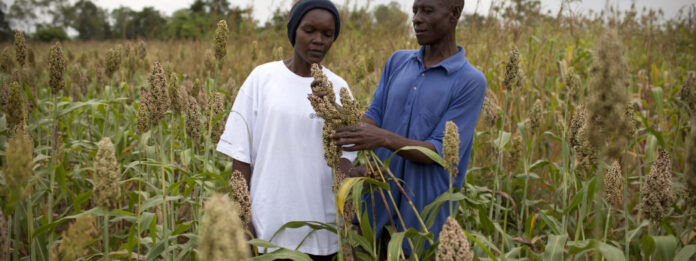
The United Nation’s International Fund for Agricultural Development (IFAD) and partners has unveiled a new financing mechanism to beef up support to small-scale food producers in rural communities in Kenya, Rwanda, Tanzania and Uganda to adapt to a changing climate.
This follows the recently released data indicating that there is a sharp global decline in climate finance dedicated to adaptation efforts.
The Africa Rural Climate Adaptation Finance Mechanism (ARCAFIM) is a large-scale model of tailored finance for poor small-scale food producers and rural microenterprises. Small and medium-sized rural agribusinesses will also access concessional loans through this new scheme. The mechanism is scalable and can be replicated in other countries and regions.
“We need to invest at speed and scale to ensure rural populations, including rural small scale food producers, are able to adapt to climate impacts now,” said Alvaro Lario, President of IFAD, at ARCAFIM’S launch event at the climate change conference (COP 28). Lario emphasized IFAD’s commitment to making a positive impact on people’s lives through innovative financial solutions such as ARCAFIM, bringing together funding from like-minded partners, and leveraging collaboration with the private sector.
Access to financial resources
Access to financial resources is crucial for maintaining and enhancing the agricultural livelihoods upon which vulnerable rural communities depend.
The urgency to bolster their resilience to climate change is evident. By supporting small and medium-sized enterprises in rural areas, we can simultaneously boost employment, income, and essential services for these communities.
ARCAFIM is dedicated to alleviating poverty and hunger in Eastern Africa. Its goal is to promote sustainable and profitable agricultural practices while building the capacity of rural communities to withstand various climate and economic challenges.
The mechanism will tap into potential connections within IFAD’s current project portfolio in the region.
Private sector involvement
ARCAFIM incorporates blended finance and encourages private sector involvement through a risk-sharing mechanism.
Equity Bank Kenya and its subsidiaries in Rwanda, Tanzania, and Uganda (affiliated with Equity Group Holdings) are set to contribute US$90 million.
IFAD will supplement this with an additional US$90 million, sourced from Finland, the Green Climate Fund (GCF), and the Nordic Development Fund (NDF).
The combined US$180 million will be allocated for climate change adaptation loans. Additionally, partners, including Denmark and GCF, will mobilize US$20 million to provide technical assistance aimed at enhancing the market’s capacity to deliver climate adaptation finance.
“We are pleased to have the Equity Group as our implementing partner. Equity is a well-established private bank in East Africa with a strong capacity for rural lending. And they are committed to expanding climate adaptation finance, which is what ARCAFIM aims to do to trigger a systemic change in climate change adaptation financing to reduce poverty and hunger in Eastern Africa,” said Lario.
He also expressed gratitude for the collaboration with the Nordic countries, highlighting their global reputation for climate finance innovations.
The event launching the finance mechanism was moderated by Dr. Jyotsna Puri (Jo), Associate Vice-President, Strategy and Knowledge Department at IFAD. Carla Montesi, Director for the Green Deal and Digital Agenda at the Directorate-General for International Partnerships, European Commission; James Mwangi, Group Managing Director and CEO, Equity Group Holdings; Karin Isaksson, Managing Director, Nordic Development Fund (NDF); Lilian Macharia , Director of Portfolio Management, Green Climate Fund (GCF); Ole Thonke, Undersecretary of Development Policy Ministry of Foreign Affairs, Government of Denmark; and Ville Tavio, Minister of Foreign Trade and Development, Government of Finland, also participated at the event.







